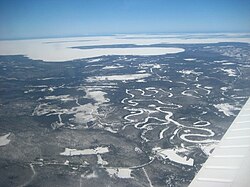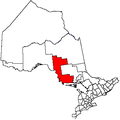This is an old revision of this page, as edited by 209.105.201.82 (talk) at 20:04, 6 January 2009. The present address (URL) is a permanent link to this revision, which may differ significantly from the current revision.
Revision as of 20:04, 6 January 2009 by 209.105.201.82 (talk)(diff) ← Previous revision | Latest revision (diff) | Newer revision → (diff) Unorganized area in Ontario, Canada| Algoma, Unorganized, North Part | |
|---|---|
| Unorganized area | |
 An aerial view of Goulais River. An aerial view of Goulais River. | |
| Country | Canada |
| Province | Ontario |
| District | Algoma |
| Government | |
| • MP | Brent St. Denis (LPC) |
| • MPP | Mike Brown (OLP) |
| Area | |
| • Total | 44,016.97 km (16,995.05 sq mi) |
| Population | |
| • Total | 5,717 |
| • Density | 0.1/km (0.3/sq mi) |
| Time zone | UTC-5 (EST) |
| • Summer (DST) | UTC-4 (EDT) |
| Postal code span | P0M, P0R |
| Area code | 705 |
Algoma, Unorganized, North Part is an unorganized area in northeastern Ontario, Canada, comprising all areas in Algoma District, north of the Sault Ste. Marie to Elliot Lake corridor, which are not part of an incorporated municipality or a First Nation.
The division had a population of 5,717 in 2006.
Communities
Agawa Bay
Agawa Bay (47°20′N 84°40′W / 47.333°N 84.667°W / 47.333; -84.667 (Agawa Bay)) is located along Highway 17 at the southern boundary of Lake Superior Provincial Park.
Amyot
Amyot (48°29′N 84°57′W / 48.483°N 84.950°W / 48.483; -84.950 (Amyot)) is located on the Canadian Pacific rail line, on the shores of Negwazu Lake, around 10 km east of Highway 17.
Batchawana Bay
Dalton
Dunns Valley
Franz
Franz (48°28′N 84°25′W / 48.467°N 84.417°W / 48.467; -84.417 (Franz)) is located on Hobon Lake, 130 miles (209 kilometres) north of Sault Ste. Marie and 65 kilometres (40 miles) from Chapleau. Franz once had a booming economy in forestry, transportation and mining. The community's original name was Hobon. In 1914, the post office's name was changed to Franz, and the railway station was renamed from Hobon to Franz Station after former Algoma Steel executive William Charles Franz.
Frater
Goudreau
Goudreau (48°15′00″N 84°31′59″W / 48.250°N 84.533°W / 48.250; -84.533 (Goudreau)) was built as a stopping point along the Algoma Central Railway.
When the Cline mine opened, Goudreau sprang to life with some 200 residents coming to the area to work. Not all of the residents worked in the mine, some of them were pospectors in search of the gold, silver, copper and iron pyrite. During the First World War, the mine was leased to the Nichols Chemicals company for the production of sulphuric acid. After the war ended, the market fell and the mine ceased operations. Other mines soon set up operations in the area. They went by the names of The Emily, Algold, Algoma Summit and The Edward. Each mine had a town site for their employees.
The town continued to grow, with the building of a two-storey railway station, workers homes and a movie theatre. A post office was built in 1915 and closed in 1966.
The Second World War ultimately led to Goudreau's demise as the demand for gold came second to iron and steel for the war. The mines eventually closed down as costs increased. Located along, Highway 519, Goudreau is now a virtual ghost town, still used for logging operations and summer homes.
Goulais Bay
Goulais Bay is a body of water located south-west of Goulais River, Ontario. It is made up of approximately 50km and is commonly used for fishing and various other recreations, such as boating.
Goulais River
Goulais River is located at the western terminus of Highway 552, on the Goulais river. The community began in 1882 and was founded by Captain Fred Tilly, for whom the town's Captain Tilly Community Centre is named. The post office was established about 1940. Today, the commercial centre of Goulais River consists of the combination general store and post office but also has a variety of churches, stores and other services in the area. The community was formerly served by the Goulaigan Free Press community newspaper, but is now only served by the Northern Newsletter.
Hawk Junction
Hawk Junction (48°04′59″N 84°33′00″W / 48.083°N 84.550°W / 48.083; -84.550 (Hawk Junction)) is located just north of Highway 101, about Template:Km to mi east of Wawa. The community was established by people of Italian, Scottish and French descent in 1909 when the Algoma Central Railway was built through the area. In 1923-1924 it was completely destroyed by fire. The community was rebuilt and is now a terminal for the Algoma Central Railway.
Hawk Junction has hardly any services and relies on nearby Wawa for its services. It is however a good starting point for wilderness hunting and fishing trips. During the winter Hawk Junction is a major snowmobile drop off point.
Heyden
Heyden is located in the geographic township of Aweres, about 14 km (9 miles) north of Sault Ste. Marie at the intersection of Highway 17 and Highway 556. The area is best known as a recreational resort, with skiing, snowmobile and all-terrain vehicle trails maintained by the Sault Trailblazers. There are many small lakes in Heyden, including Heyden Lake, Upper and Lower Island Lake, Redrock Lake, Finn Lake and Trout Lake, which are popular cottage country areas.
Heyden has one elementary school, Aweres Public School, which opened in 1963. The school is a medium-sized (2,407 square metres or 25,910 square feet), single storey building and it serves students from both Heyden and Searchmont. The school also has three baseball fields, a soccer field, a basketball court and an outdoor ice rink that is regularly maintained in the winter time. Heyden is home to one restaurant/motel, "The Mountain Ash Inn", and one gas station. The town also has a pizza shop, a restaurant/bar and a confectionery store.
Island Lake
Island Lake is a lake located just 1.6km north of Heyden, Ontario. The lake is split into two different sections separated by a causeway. The causeway is used to enable transportation for residents who live on the south-western edge of the lake. In total, Island lake is made up of approximately 2130198m. Residents often refer to each section as either "Upper Island Lake" or "Lower Island Lake", upper being the northern section and lower being the southern section. The lake is often used for various types of recreation, such as fishing, ice fishing, snowmobiling, boating and water-skiing. Various types of fish are found in this lake, such as Perch, Bass and Lake Trout. A large portion of houses located on this lake are used primarily as camps, for occasional residency.
Karalash Corners
Kirby's Corner
Kirby's Corner is located within the unincorporated Van Koughnet Township north of Sault Ste. Marie.
Leeburn
Leeburn is located along Highway 638. There is no crossroad in this community. The town has a nice background view of the northern Ontario mountains. At one time there was a gold mine at Bass Lake, a few kilometres north of Leeburn. Unfortunately the quality of the ore found was not sufficient to make the mine profitable.
Lochalsh
Lochalsh is a ghost town located near Goudreau. A taxi ran between the two townsites and the mine. When the Cline mine closed in 1946, both towns became ghost towns. There are still active mining operations in the area as well as a few ghost mines.
MacDuff
Missanabie
Missanabie (48°18′00″N 84°04′59″W / 48.300°N 84.083°W / 48.300; -84.083 (Missanabie)) is located on a local road near the northern terminus of Highway 651, just outside the boundaries of the Chapleau Crown Game Preserve. A designated place served by a local service board, the community had a population of 62 in the Canada 2006 Census.
Montreal River
Oba
Oba (49°04′01″N 84°06′00″W / 49.067°N 84.100°W / 49.067; -84.100 (Oba)) is located along the Algoma Central Railway route approximately halfway between Dubreuilville and Hearst. The community is also accessible by a local road network extending from Highway 583.
Ophir
Ophir (46°27′48.00″N 83°43′44″W / 46.4633333°N 83.72889°W / 46.4633333; -83.72889 (Ophir)) is a sparsely populated farming community located 25 km north of Bruce Mines. It's centered at the intersection of the east-west and north-south portions of Highway 638.
Non-native settlers began farming in the area around the time the mines of Bruce Mines closed in 1875. In November, 1889, William Moor, a farmer prospecting after the fall harvest, found ore containing gold atop a ridge overlooking what was then Lake Ickta (now Havilah Lake). After some ownership dispute, American investors organized the Ophir Gold Mining Company (named after the biblical Ophir) to purchase the land in 1892. A small mining town was built, and gold mining operations commenced in 1893, producing 2489 tons of ore worth $8459. Operations ceased due to a financial panic in the United States and a fatal mining accident. The name of the mine and lake were changed to Havilah, another biblical reference, as mining resumed from 1910 to 1911, but the operation and its buildings were subsequently abandonedForty-fifth Annual Report of the Ontario Department of Mines</ref>
Parkinson
Poplar Dale
North of Ophir, this region was settled in the late 19th century for primarily agricultural reasons. The community is comprised of all peoples living along the Poplar Dale Rd. and its tributaries, north of the Thessalon River. The community's major exports are beef and timber.
Ranger Lake
- location of an old fire tower.
Red Rock
Searchmont
Searchmont (46°47′N 84°03′W / 46.783°N 84.050°W / 46.783; -84.050 (Searchmont)) is a small community located northeast of Sault Ste. Marie. It is best-known for the ski resort of the same name located within the community.
The town of Searchmont received its name in honor of T. C. Search, the treasurer of the consolidated Lake Superior Company. Searchmont was once a bustling community built around the forestry industry. The local sawmill was the livelihood of most of the residents. When the mill closed in the early 1990s, much of the population moved away. Some now consider Searchmont to be a ghost town in comparison to what it once was.
The Searchmont Community Centre recently was renovated in 2002 with the aid of a SuperBuild grant provided by the Ontario government.This grant was successfully granted to the community of searchmont because of all the hard work and dedication of Vivian Mccormack(1958-2008)and the Searchmont LSB. Currently the Searchmont Community Centre has a recreation cafe that is run by volunteers to help raise money for community needs, and to help bring the community together. Part of the newly renovated Searchmont Community Centre has been named after Walter Senko, a recently deceased school teacher who is considered to be a hero among many of the locals.
Wabos
Wabos is a township located approximately 8.6km north-west of Searchmont, Ontario.
Wharncliffe
Statistics
- N/A = Data not available
References
- ^ Algoma Country communities
- Third Report of the Bureau of Mines, 1893.
- Nineteenth Annual Report of the Bureau of Mines, 1910
- Searchmont Resort
- Community of Searchmont website


